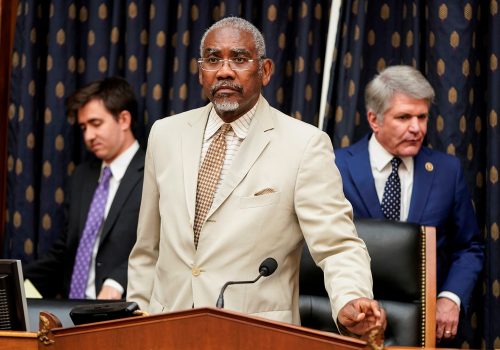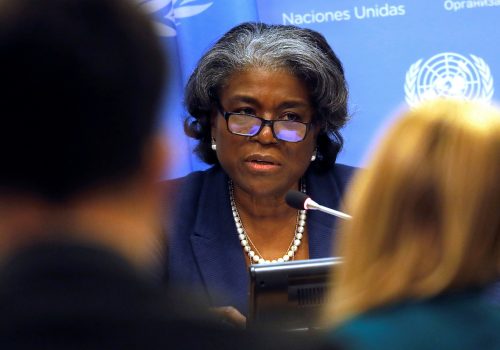Africa’s cultural revolution is here. Meet some of its movers and shakers.
Gripped by a transformative cultural revolution that’s swept through everything from literature and film to video games and fashion design, Africa is having a moment in the sun. It’s not only socially significant but also strategically valuable.
These days, the continent is proving that soft power is the new hard power.
On Friday the Atlantic Council brought together Africa’s brightest cultural minds—and the policymakers who’ve helped make their achievements possible—for the Africa Creative Industries Summit, to understand how this transformation can reach far beyond the creative and cultural realms to foster collective security and prosperity.
Here’s what they had to say:
Forging Africa into a “powerful tool for change”
As the cultural revolution takes hold, “the stakes are high” for Africa’s emerging markets, said President Roch Marc Christian Kaboré of Burkina Faso. He explained that promoting African soft power through its creative industries can create jobs for young Africans, revive the economy, and play a role in the continent’s development. Thus, he called for African governments to prioritize the “inclusion of the creative industries in our development and industrialization policies,” and for investments from development agencies and the private sector to propel the sector’s growth. The end goal is for Africa to be not just a “source of inspiration” but also “a powerful tool for change.”
American culture, African roots
Relaying a message from US Vice President Kamala Harris, Jessica Davis Ba, senior coordinator and special advisor for Africa in the office of the vice president, said that while the United States is the global leader in the creative industries, “American culture is rooted in African culture.” She credited these roots to African people who passed down cultural traditions “even through slavery.”
Davis Ba said that this shared African-American cultural history connects people, while also creating jobs and economic opportunities for millions. Thus, “we must do more to support the heroes and sheroes of our creative industries,” she said, including by protecting intellectual property, advancing human rights so that people “can express themselves freely and without fear,” and forming partnerships to employ new technologies that connect cultural industries to markets worldwide.
“There is power in music, of course, but even more so, there is power in being African. There is power in owning that identity.”
Nomcebo, South African singer and songwriter
A “remarkable opportunity” for the United States
Dana Banks, special assistant to the US president and senior director for Africa on the National Security Council, said that with Africa’s integration into global markets and its demographic boom, there is “a remarkable opportunity” for the United States to “build back better at home and abroad” by investing in Africa’s future. Creative industries will be at the core of the strategy.
Banks discussed how the Biden administration is working with policymakers, the private sector, and creative industry leaders to bolster Africa’s economic growth. With the African Growth and Opportunity Act forum approaching, Banks highlighted how the act provides a tax exemption for certain cultural goods. Banks also explained that the administration has a specific focus on the US-based African diaspora and their businesses in its reimagined Prosper Africa Initiative. Such initiatives and investments “are critical for reflecting the diverse nature of the United States” and for recognizing the “unique historical connection between the United States and the African continent,” Banks said. “We believe it is important to foster and prioritize these ties by helping to bring African countries, their talents and their businesses, and their youth and their products forward into the global market.”
An investment for future creative industries
“It’s time that we convert some of the ways we’re thinking about assistance,” said US Representative Sara Jacobs (D-CA-53). While funding Africa’s creative industries is important, Jacobs said the United States can’t assume it knows all the answers or simply throw money at the continent. Instead, it should figure out “how we really partner with countries to build up these industries.”
Boosting quality education is a top priority, Jacobs said, particularly because some education systems are “still very rooted in the colonial experience,” focusing on memorization over thoroughly understanding concepts. Plus, the pandemic has proven how critical digital literacy is. “We need to make sure that those young people are getting educated with the skills that they’re going to need to be successful.”
With Africa being the world’s youngest continent with the fastest population growth, Jacobs explained that quality education is critical to fuel functioning and innovative governments to export African goods, arts, and ideas to the rest of the world. In the long term, “we’re really making sure that it’s getting to other markets,” Jacobs noted.
Our next challenge will be youth employment… If we are not careful enough, this will create problems for our country and also for the rest of the world because it’s a question of national security… And this is the time for our government, private sector to come together and the rest of the world to come together to create an ecosystem that will help.
Samba Bathily, founder and chief executive officer of Africa Development Solutions Group
On turning potential into success
Former Chelsea striker and Ivory Coast national football team captain Didier Drogba recalled returning to his home community to focus on digital literacy. He noted it was an important issue for him as an athlete because “60 percent of the [African] population is under twenty-five, and they’re the ones who are watching the games, they are the ones always on social media… [and] they are the future of the continent.”
❝60% of the population is under 25. They are the future of the continent… Africa has a lot of potential and our challenge as leaders is to turn this potential and to make it a success.❞ #AfricaTimeHasCome
— Atlantic Council (@AtlanticCouncil) October 15, 2021
⚽️|@didierdrogba pic.twitter.com/B6O9vEoKnt
Africa’s cultural strength will determine its resurgence
To keep up with its growing population, Africa needs to create one million jobs every month, said Ambassador of the African Union to the United States Hilda Suka Mafudze. And Africa’s creative industries may be up for the challenge, as the quickly growing sector will be a “key employer,” boost the continent’s gross domestic product, and spur a digital transformation, she said.
But African Union member countries need to “get a grip” and realize that creative industries “are more than just business sectors with a growing economic value,” Suka Mafudze said. They’re also “key soft-power tools” conveying the values of the continent. “This can be one industry that can make a difference” to Africa’s development and diplomacy, she said.
In its Agenda 2063, the African Union declared that it would strive for an Africa with a strong cultural identity, common heritage, shared values, and ethics. At Friday’s event, Suka Mafudze added that the strength of Africa’s cultural identity will be a “critical factor of Africa’s reemergence on the global stage.”
This free trade agreement may change the game
“Every aspect of Ghanaian life tells an imaginative story,” said Ghanaian President Nana Akufo-Addo. “We have a lot to tell the world.” In order to spread those stories, Akufo-Addo said that the government is creating an environment in which artists “get recognition and good value for their work.” It comes from improving copyright laws, building infrastructure such as arts warehouses, and setting up opportunities for people to experience art such as photography exhibitions and film screenings.
But Akufo-Addo noted that this moment in the cultural revolution is significant: Instead of arts and culture “being limited to the expression and display of customs, practices, and values,” he said, they’re now powerful “interconnected tools” that can “bring about the attainment of economic power and dignity for peoples of African descent.” Now, he said, governments will need to fold creative industries “into the broader development agenda” by sustaining their investment and addressing hurdles that cut them off from wider markets. “The Africa we want may never be realized if we turn our backs on our arts, culture, customs, and heritage,” he said.
The president praised the African Continental Free Trade Area for its potential role in supporting the continent’s creative industries, saying that by entering the market, producers of cultural goods and arts “have the opportunity to address a market of 1.2 billion people.” He called the agreement “one of the most important decisions that we on the continent have taken.”
“The creative industry is crucial in transforming the African continent in creating jobs and also boosting other aspects of the African economy.”
Benedict Oramah, president of Afreximbank
Governments: Here’s how you can help
Cabo Verde’s Minister of Culture and Creative Industries, Abraão Aníbal Fernandes Barbosa Vicente, said that while there is a cultural “revolution” afoot in Africa, there are challenges that governments will have to address in support of their creative industries. Governments will need to set up copyright management entities because without copyright protections, “the African culture would soon be in the hands of other nationalities,” he said. African countries will also need to build infrastructure that supports national and international artistic events. It will require the government to “put culture in first place,” he said.
Vicente also explained that when working with the United States, Europe, and China, African countries are building education and health systems, but not supporting creative industries. The countries will need to start thinking about global tools to support artists and cultural leaders, like international agreements to facilitate visas for travel or even deals to bring more technological capabilities to the continent that help artists gain access to markets.
Creative industries as “levers of influence and power”
“Culture eats strategy for breakfast,” noted Akunna Cook, US deputy assistant secretary of state for African affairs. For example, people turned to arts, sports, and culture—not government policy—during the pandemic to make sense of the moment. “The creative industries, therefore, influence and shape policy and events,” she said, adding that they are “important levers of influence and power.”
Cook also explained that African creative industries have the power to transform how others, particularly investors, perceive and interact with the continent. So often, images of Africa focus on death, disease, and despair. “We have to change that to understand that Africa is really a place full of opportunity, full of innovation, and full of creativity,” Cook said. And industries like Nollywood—Nigeria’s film sector—have a major role in changing that.
Another source of power: the African diaspora. “The ties that bind us together are our strength,” Cook said. So telling better stories about Africa, but also stories about the movements that have shaped the African diaspora community, “is the power that’s going to shape our future for Africans around the world.”
“Africa’s culture has gone global, from Hollywood to Wall Street. Investors should be paying attention; the whole world should pay attention.”
Akinwumi Adesina, president of the African Development Bank
Reclaiming Pan-Africanism
Barbadian Prime Minister Mia Mottley touted a number of her Caribbean country’s creative industries, including the sport of cricket. Barbados’s global recognition for cricket has reaped rewards by allowing young people to get involved as nutritionists, personal trainers, stadium managers, and more. Creative industries have “transformative power,” Mottley said.
But she reminded the audience not to look “at our creative industries in terms of economics and profits alone,” because they also have “immense power and influence… above and beyond the contributions to the economy.” For example, Mottley explained that cricket has helped children “overcome prejudice, discrimination, cultural differences, and intolerance,” as they share the pitch with teams from around the world.
As the prime minister of a country with a large population of African descent, Mottley said her island nation carries a spirit of Pan-Africanism. Expanding creative industries could help enliven that spirit. “We have to remove the middleman that has continued to refuse to allow us to deal with each other directly,” Mottley said. “It is through the creative industries that that commonality of purpose and mission will be found between our populations.”
Shoot your shot
Amadou Gallo Fall, president of the Basketball Africa League, said he believes that there is “something truly powerful about the game of basketball,” in contributing to economic development in Africa. Not only has the league created jobs—everything from players and coaches to videographers and sports reporters—but Fall said that the “entire creative industry is going to be brought to life.” Singers, artists, and athletes will use sports to connect with young people, inspiring them to be innovative and contribute to Africa’s future growth. But Fall says that there’s still work to do to solidify the league’s economic role. The Pan-African league needs infrastructure like easier options for travel to succeed, “and this is where policymakers and governments are going to play a key role,” said Fall.
“When I think about Africa, I think about the 1.2 billion people who are living in Africa, but I’m also thinking about the Africans who live in the diaspora… We’re looking for ways that we can reach and teach each other.”
Melvin Foote, president and chief executive officer of the Constituency for Africa
Watch the full event
Katherine Walla is the assistant director of editorial at the Atlantic Council.
Further reading
Image: Jessica Davis Ba, senior coordinator and special advisor for Africa in the office of the US vice president Kamala Harris, speaks at the Atlantic Council's Africa Creative Industries Summit on October 15, 2021. Photo via Jasper Gilardi.


